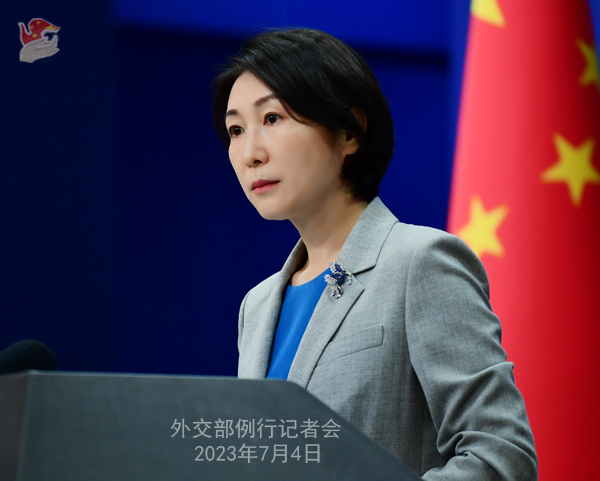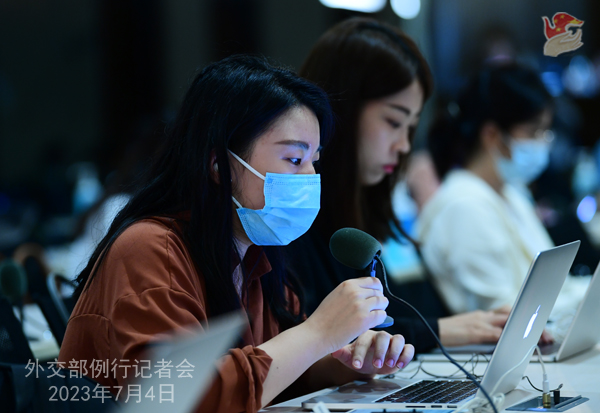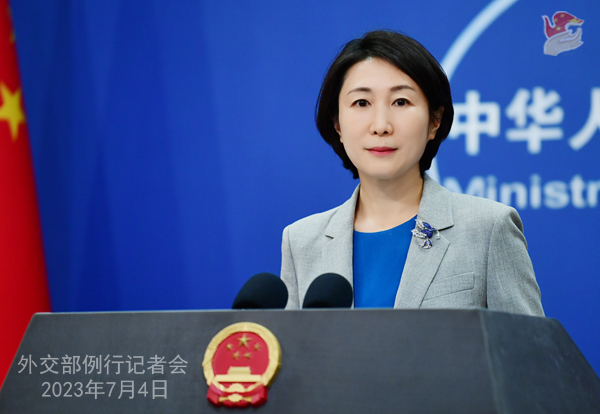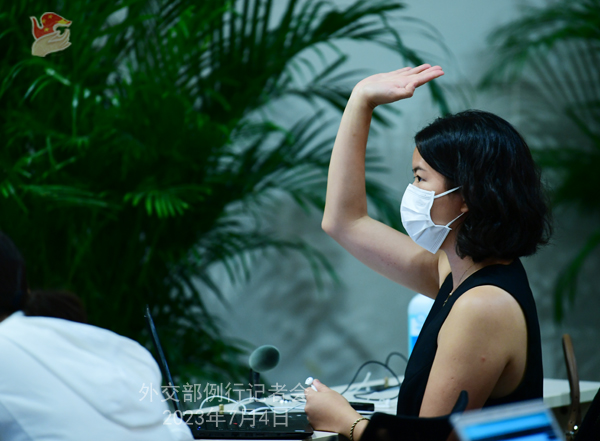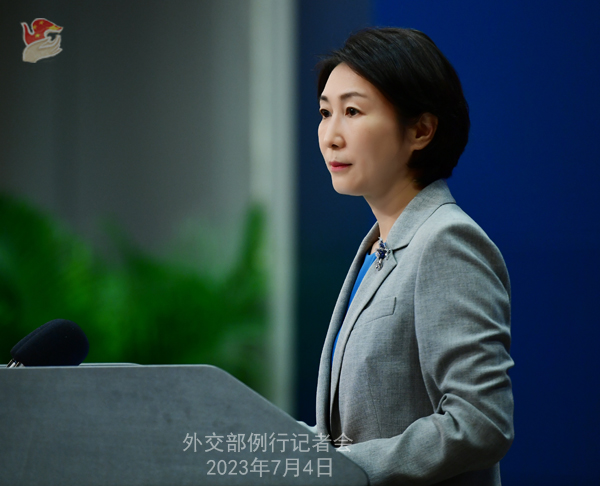| Foreign Ministry Spokesperson Mao Ning’s Regular Press Conference on July 4, 2023 |
| 2023-07-04 17:31 |
|
CCTV: The Hong Kong police issued arrest warrants on July 3 for eight anti-China rioters who have fled overseas, including Kevin Yam. The US, the UK and Australia expressed their concern and even “condemned” the decision. What is China’s comment? Mao Ning: We strongly deplore and firmly oppose individual countries’ flagrant slandering against the national security law for Hong Kong and interference in the rule of law in the Hong Kong SAR. Kevin Yam and the others have long been engaging in anti-China activities aimed at destabilizing Hong Kong. After fleeing overseas, they have acted in an even more outrageous way to create trouble and continued to instigate the division of the country and subversion of state power, acting as pawns for external anti-China forces in their effort to interfere in Hong Kong affairs. Their abominable moves gravely violate the national security law for Hong Kong, seriously threaten the bottom line of One Country, Two Systems, severely harm the fundamental interests of Hong Kong and gravely jeopardize China’s sovereignty, security and development interests. Justice will never be late or absent. The Hong Kong police issued arrest warrants for these destabilizing elements in accordance with the national security law and other local laws. This is a just act that meets the aspiration of the people and upholds the rule of law, a necessary act for safeguarding the authority of the national security law and protecting the nation’s sovereignty and security, and a legitimate act for consolidating the fruits of ending chaos and ensuring lasting stability in Hong Kong. This act is also consistent with international law and customary practice. I would like to reiterate that Hong Kong affairs are purely China’s internal affairs and brook no meddling by any external forces. Relevant countries need to respect China’s sovereignty and the rule of law in Hong Kong, stop lending support for anti-China elements destabilizing Hong Kong, and stop providing a safe haven for fugitives. China remains firmly resolved in safeguarding the nation’s sovereignty, security and development interests, in implementing One Country, Two Systems, and in opposing interference in Hong Kong affairs by any external forces. CCTV: Recently, surveys in China and the ROK show that people in Pacific Rim countries oppose the release of nuclear-contaminated water into the sea. People staged large-scale rallies in the ROK and protested in front of Japanese embassies and consulates in the Philippines, New York and Sydney, demanding that Japan stop pushing forward the ocean discharge plan. The Fukushima Prefectural Federation of Fisheries Co-operative Associations unanimously adopted a resolution expressing opposition to the government’s plan to release nuclear-contaminated water into the ocean. However, on July 3, Japan’s Chief Cabinet Secretary Matsuno Hirokazu reiterated that there will be no change to the government’s plan to start the release around this summer. Do you have any comment? Mao Ning: I noted relevant reports. The Japanese government’s pushing ahead with the ocean discharge plan has raised widespread concerns and worries from the international community. A Global Times survey conducted in 11 countries including China, the ROK, Japan, the Philippines and New Zealand indicates that of the 11,000 respondents, nearly 90 percent showed worries, fear and anger toward the plan, and more than 90 percent of them support their countries in taking measures to intervene in Japan’s ocean discharge plan. Regrettably however, the Japanese government has been stubbornly pushing through its ocean discharge plan and trying every means to give the false impression that the discharge is legitimate and justified. The IAEA will issue the review report later today. I would like to point out that the agency was invited by the Japanese side and its mandate is limited to evaluating the ocean discharge plan. The report cannot greenlight the discharge as it cannot prove that ocean discharge is the only option or the safest and most reliable option. China once again urges Japan to, in a responsible attitude for the whole humanity and our future generations, stop pushing through the discharge plan, fully explore and evaluate the alternatives to ocean discharge to ensure that the nuclear-contaminated water is handled in a scientific, safe and transparent manner, and agree to rigorous international oversight.
Global Times: Sweden recently witnessed another burning of the Quran, which was strongly condemned by the Arab world and the Islamic world. The incident has made international headlines. What’s China’s comment? Mao Ning: China always upholds mutual respect, inclusiveness and mutual learning between civilizations, firmly opposes extremist acts attacking different religious beliefs and inciting civilization clash and all forms of Islamophobia. The Islamic civilization has made important contribution to world civilizations. The Muslim faith and religious feelings should be respected. The so-called “freedom of speech” should not be the excuse for stoking conflicts and antagonism between civilizations. President Xi Jinping proposed the Global Civilization Initiative this March. It advocates equality, mutual learning, dialogue and inclusiveness among civilizations and replacing estrangement with exchange, clash with mutual learning, and superiority with inclusiveness. China will work with the international community to advocate the spirit of the Global Civilization Initiative, promote inter-civilization exchanges and dialogue with concrete actions and jointly safeguard the diversity of world civilizations. NHK: A follow-up question on the discharge plan of nuclear-contaminated water from the Fukushima Daiichi nuclear power plant. What you just said meant China would not accept the IAEA report if it supports the discharge. Is it so? If so, wouldn’t this be China playing double standards for not accepting the science-based measures proposed by the IAEA while saying that it has always followed the basic norms governing international relations based on the purposes and principles of the UN Charter? Mao Ning: We have not seen the IAEA report yet. What I just said is that the mandate of the agency is limited to evaluating the ocean discharge plan only by the Japanese side from the very start and the agency does not have the mandate to evaluate other options. In this case, the report to be released will not prove the discharge is legitimate and justified and exempt the Japanese side from its due responsibilities and obligations under international law. This has nothing to do with double standards. On the report by the IAEA, we hope that it will stand the test of science and history, rather than be an endorsement for the discharge of nuclear-contaminated water. Kyodo News: The Chinese government yesterday announced export control on gallium and germanium, two elements essential for manufacturing semiconductors, in apparent retaliation after the US, Japan and the Netherlands restricted semiconductor equipment exports to China, as some said. Do you agree with this argument? Also, considering that the Chinese government said it is committed to keeping the global industrial and supply chains stable, this export control seems inconsistent with what it has been saying. Does the foreign ministry have any comment on this? Mao Ning: Regarding what you mentioned, the Ministry of Commerce of China has issued a notice and you may refer to it. China is always committed to keeping the global industrial and supply chains secure and stable, and has always implemented fair, reasonable and non-discriminatory export control measures. The Chinese government’s export control on relevant items in accordance with law is a common international practice, and it does not target any specific country.
Beijing Daily: According to reports, Honduran Minister of Economic Development said that Honduras and China have started negotiations on a free trade agreement. Can you confirm this and provide some comment? What is China’s expectation for the FTA negotiations? Mao Ning: On the morning of July 4 Beijing time, Minister of Commerce of China Wang Wentao and Minister of Economic Development of Honduras Fredis Cerrato jointly announced the official launch of the negotiations on a free trade agreement between the two countries via video link. This is an important common understanding reached between the two heads of state during Honduran President Xiomara Castro’s visit to China, and it fully demonstrates the willingness of the two sides to deepen practical cooperation. Since the two countries established diplomatic ties, bilateral relations have shown the momentum of robust growth, with expanding practical cooperation in various fields. China stands ready to work with Honduras to further tap into the potential, create more highlights, and work for more outcomes in the mutually-beneficial cooperation, so as to create an even brighter future for the relations between the two countries. AFP: I have a question also related to the eight people wanted by the Hong Kong government for their involvement in 2019 protests. China’s embassy in London today criticized British politicians specifically for protecting these eight people. Will this have any impact on a potential upcoming visit by the UK’s foreign secretary James Cleverly to China? Mao Ning: I have stated China’s position just now on relevant countries’ response to the Hong Kong police issuing arrest warrants for anti-China rioters. On the visit you asked about, I have nothing to share at the moment. AFP: I have two more questions. Firstly, can you confirm reports that the EU representative Josep Borrell will visit China next week? The second question is whether you can share details for the upcoming visit by US Treasury Secretary Janet Yellen to China? What’s China expecting from the visit? Mao Ning: On your first question, I have nothing to offer. On your second question about US Treasury Secretary Janet Yellen’s visit to China, I noted that my colleague has answered relevant question yesterday. The Chinese side has released information on the visit. As to your specific question, I’d refer you to the competent authorities. We always believe that China-US economic and trade cooperation is mutually beneficial in nature and hope that the US can create a favorable environment for the sound development of China-US economic and trade ties and win-win cooperation with concrete actions.
CGTN: Recently, leaders from countries including Viet Nam, Mongolia, and Barbados expressed their support and appreciation for the Global Security Initiative proposed by President Xi Jinping during their visit in China. They want to be part of it, contributing to global peace and stability. We can feel the enthusiasm from the international community for the initiative, and we can see the good momentum of delivering on the initiative. Could you share more with us? Mao Ning: In April 2022, President Xi Jinping put forward the Global Security Initiative (GSI), which has received positive response and extensive recognition globally. More and more countries have supported and appreciated the GSI and are looking forward to be part of it. All sides believe that the GSI proposed by President Xi Jinping actively responds to the significant security concerns of the international community and speaks to the aspiration for peace and cooperation shared by all countries, providing Chinese wisdom and impetus for solving the security challenges facing humanity and improving global security governance. Particularly, recent diplomatic events on the political settlement of the Ukraine crisis and the reconciliation between Saudi Arabia and Iran showed China’s responsibility as a major country in pressing ahead and taking initiative in global security governance and the important role of the GSI in solving international security challenges. The GSI as a global public good serves the interests of people around the world and safeguards peace for the whole world. China stands ready to join hands with all sides to deepen the implementation of the GSI and bring more benefits to the people, tackle the pressing security challenges facing the world, advance peace and development for humanity, and make the world more peaceful, secure, and prosperous. AFP: Viet Nam has reportedly banned the upcoming Barbie movie over the appearance of a world map that allegedly shows China’s nine-dash line in the South China Sea. Do you have any comment on this matter? And is the inclusion of the nine-dash line in world maps an explicit prerequisite for foreign films to be released in China? Mao Ning: China’s position on the South China Sea issue is clear and consistent. Relevant country should not link the South China Sea issue with normal cultural exchange.
|
 | ||||||||||||
 | ||||||||||||
|
